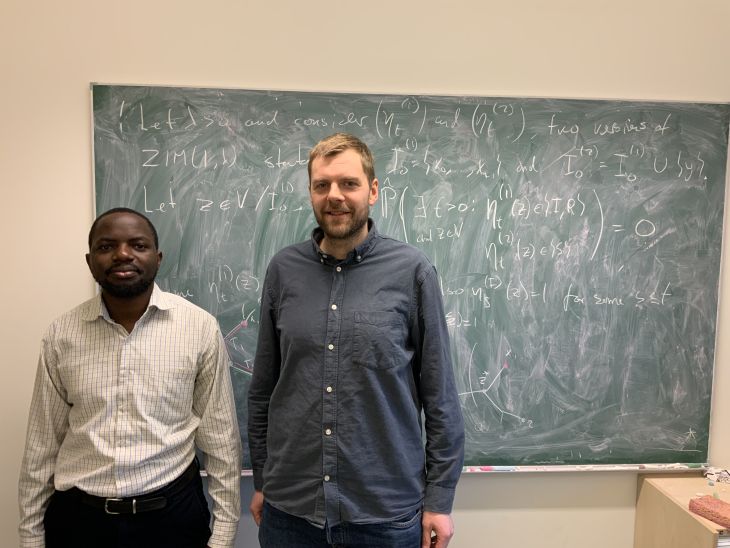When Frank Namugera first heard that the Math4SDG project was looking for PhDs, the mathematics student from Makerere University jumped at the chance.
“I first heard about it in our university network and that this Norwegian led project was looking for PhDs in mathematics. So, I applied, was interviewed at the end of 2021 and was successful,” says Namugera who is now well into his four-year stint as a PhD candidate in the Math4SDG project, which is funded through the NORHED II programme of Norad.
Third visit to Bergen
In spring 2024 the young Ugandan scholar made his third visit to Bergen to meet his supervisor at the University of Bergen, Associate Professor Stein Andreas Bethuelsen at the Department of Mathematics. He had been asked by Math4SDG’s Principal Investigator (PI), Professor Guttorm Alendal, if he could be one of the supervisors in the project.
“When I was asked about this, I looked at the profiles of the candidates to see who had the closest profile to what I’m working on, which is probability theory and mathematical statistical mechanics. Frank had done a master on random matrices and that was the connection,” says Bethuelsen.
Namugera’s expectations on travelling to Bergen this year were high as it was his first visit to other countries in Europe.
“When you work online it’s very different from having a physical interaction, so being in Bergen has seen me make much more progress than I did at home. We discuss much and on a daily basis. We get to break down into the nitty gritty rather than making assumptions online,” says the PhD candidate.
His supervisor concurs.
“The best thing with having Frank here is that we have regular meetings during his two months in Bergen. Not daily but at least every second day and where we work closely together to ensure progress on his PhD research. We both benefit from this. When he’s in Makerere we usually meet digitally only every two weeks,” says Bethuelsen.
Mathematical modelling of epidemics
One of several aims of the Math4SDG project is to build capacity in mathematics education in Uganda and Tanzania. As for Namugera’s PhD the goals and objectives are clear also beyond capacity building.
“The primary objective is conducting the research, which deals with mathematical modelling of epidemics on networks,” he says.
The expectation is for him to finish this phase of the PhD by 2025 and then focus on writing his thesis.
“Most of the focus comes in papers being published as a sign of progress. The papers are presumably complete by early next year. What remains would be thesis and defence,” says the young Ugandan scholar, adding: “It will be intense.”
Excellent networking opportunities
Namugera also stresses the importance of other aspects of being part of Math4SDG.
“It also provides me with excellent networking opportunities. I’ve already met so many people who will be useful as I chart my future career,” he says.
“As part of the PhD, Frank was one of the few lucky ones to take part in a large and prestigious summer school in Turkey. During this year’s visit to Bergen, he has also attended a one-week long workshop for young probabilists in the Netherlands, and this summer two additional schools in Uganda and Rwanda,” says supervisor Bethuelsen.
The PhD candidate praises his supervisor.
“I’ve progressed so much since I arrived here, but I think two months may be too short. In the future, if possible, PhD candidates should spend six months at the University of Bergen in projects such as this. That would speed up the process of research and learning more. Most especially in areas that are complex, like what I’m working on,” says Frank Namugera.
But he still needs to get his first paper published. When do they expect this to happen?
“We’re well on the way but the devil lies in the details. If we think we have all the basic results in summer, latest by autumn we hope to have a first draft ready,” says Stein Andreas Bethuelsen.
















